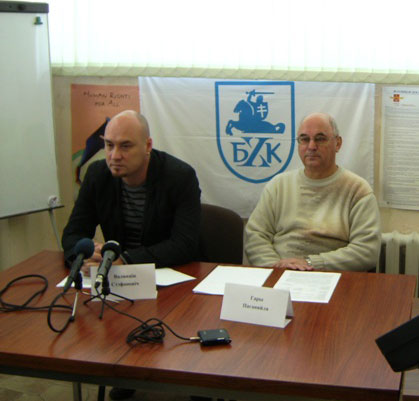'Human Rights Defenders for Free Elections': There are no positive changes in formation of territorial election commissions
On 1 October participants of the campaign Human Rights Defenders for Free Elections held a press-conference in Minsk. The observers compared the electoral situation to the previous presidential election. Tough the Deputy Chairperson of the Human Rights Center Viasna Valiantsin Stefanovich and the Chairperson of the juridical commission of the Belarusian Helsinki Committee, Hary Pananiaila, noted some progress towards the democratization of the electoral process, they stated that the general background (including violations from the side of the authorities) remained the same.
'The majority of the 80 long-term observers, who observed the establishment of the territorial election commissions (TEC) throughout Belarus, were admitted to the sittings of the executive committees where these commissions were formed, unlike the election to the local councils of deputies,' said Valiantsin Stefanovich. 'In particular, this time representatives of the local authorities sometimes even called to the observers who had applied for being admitted to these sittings, and informed them about the time and place. Nevertheless, there were cases when human rights defenders spent days in executive committees looking for information about the time and place of a sitting, or weren't admitted to these sittings by the authorities. For instance, the representative of the Belarusian Helsinki Committee Ihar Hodzka wasn't allowed to observe the formation of the territorial election commission in Babruisk.'
The human rights defenders state that the formation of the commissions cannot be called completely democratic, as the appropriate sittings were often held too quickly (they lasted just 4-30 minutes), the candidacies for membership in the commissions weren't discussed and there was no separate voting on each candidacy. In addition, the majority of representatives of the democratic opposition weren't included in the commissions: only 14 out of 92 nominees of democratic parties became members of the territorial election commissions, while 1,986 members of the commission represent the authorities or public organizations. According to calculations of the observers, 79% representatives of public organizations in the TECs belong to four pro-governmental 'NGOs' – the Belarusian Republican Youth Union (BRSM), Belarya Rus, the Belarusian Union of Women and the veteran's organization, and the official Federation of Trade Unions, though there about 2,220 registered public associations and 34 trade unions (their representatives constitute the remaining 21%). 9 out of 10 nominees of representatives of the authorities or pro-governmental organizations, and just 1 out of 7 oppositionists were included in the commissions. 'Thus, the norm that was introduced in the Electoral Code by amendments of 4 January 2010 and restricted the number of state officials in the election commissions to 1/3rd, didn’t have a real impact on the composition of the commissions', concludes Mr. Stefanovich.
According to Hary Pahaniaila, by the time of the press conference, 24 complaints concerning the formation of the election commissions have been filed to the appropriate state organs. This right is given the participants of the electoral process by part 6 of Article 34 of the Electoral Code. It was most actively used by citizens of the capital, mainly by representatives of Fair World, the United Civil Party and the Belarusian Popular Front. However, as stated by Mr. Pahaniaila, the courts tend to consider such complaints formally, as the electoral legislation doesn't determine any criteria for the choice of members of election commissions. Moreover, the law doesn't establish the order of such court sittings. A part of these complaints concerns the non-admission of observers to the sittings of the executive committees. As far as complaints against actions of the state agencies are usually passed to higher instances, some of them were to be considered by the Central Election commission. 'We weren't informed about the number of such complaints that were received by the CEC', said Hary Pahaniaila. He also added that one complaint was passed against the registration of the electoral team of Aliaksandr Lukashenka who has no legal right to run for another presidential term.
As it is stated in the concluding document of the human rights defenders, the registration of the electoral teams of the candidates for presidency was quite democratic, except for one fact – Aliaksandr Lukashenka didn't come to the Central Election commission to register his team, which is a violation of Article 61 of the Electoral Code. The observers didn't notice even the head of his team, Aliaksandr Radzkou, in the building of the Central Election commission. The human rights defenders condemn this fact and state that all people must be equal before the law.
What concerns the collection of signatures by the electoral teams of the candidates, the scope of restrictions differs from one place to another. Minsk is considered the most liberal city in this respect. However, in some other towns and cities the authorities banned collecting signatures almost anywhere. In particular, the Hrodna City Executive Committee equaled this activity to holding mass actions (for which it had determined a number of unpopular and remote places in a previous decision). However, a protest picket and collecting of signatures for a candidate for presidency are quite different things, emphasize the lawyers. The strangest case took place in Orsha, where the local state newspaper published a list of the places where it was banned to collect the signatures, which differed from the list that was uploaded to the website of the local executive committee. By the way, as said by H.Pahaniaila, the electoral teams have a legal right to apply to the executive commissions with the requests to permit them collecting signatures in more convenient and populous places.
Human Rights Defenders for Free Elections


















